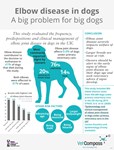Search - Research
261 - 270 of 535 results
-
New research by the RVC finds promising treatment for sclerosteosis patients
New research from the Royal Veterinary College (RVC) has identified porcupine inhibition – a strategy that blocks a key bone-related signalling pathway (Wnt) – as a promising pharmacological treatment for severe sclerosteosis. Sclerosteosis is an …New research from the Royal Veterinary College (RVC) has identified porcupine inhibition – a …
-
New research from the RVC reveals differing views on improving UK broiler (meat) chicken welfare
New research from the Royal Veterinary College (RVC) has found economic costs, environmental impacts, and misalignment between consumer purchasing and understanding are key reasons for the limited shift of UK chicken meat production to higher …New research from the Royal Veterinary College (RVC) has found economic costs, environmental …
-
Owners urged to ‘stop and think’ before buying as English bulldogs are twice as likely to have a health problem
New study from the Royal Veterinary College suggests urgent action is required to reduce many serious health issues of English Bulldogs associated with exaggerated features -
New research highlights surprisingly good health characteristics in Shih Tzu dogs in the UK
New research from the Royal Veterinary College (RVC) has found the most common conditions diagnosed in Shih Tzu dogs in the UK are periodontal disease (inflammation of the gums and tissue around the teeth), anal sac impaction and ear disorders. … -
World’s largest elbow disease study helps owners of large-breed dogs
The Royal Veterinary College (RVC) has just completed the largest ever study of elbow disease in dogs attending first opinion veterinary practices in the UK. The results have highlighted which breeds are most at risk in order to assist owners to be alert for the signs of this condition and to seek veterinary treatment early. -
RVC awarded funding to contribute to the global effort on COVID-19 health research
A project, led by researchers at the Royal Veterinary College (RVC), which seeks to reduce COVID-19 transmission in traditional food markets in Bolivia and Peru, receives fundingA project, led by researchers at the Royal Veterinary College (RVC), which seeks to reduce COVID-19 …
-
The UK’s largest ever feline dental disease study identifies age and breed as biggest risk factors
New research from the Royal Veterinary College (RVC) has shed light on the frequency, risk factors and linked health problems associated with periodontal disease in pet cats in the UK. These findings will help veterinary practitioners and owners … -
The RVC urges owners of hot dogs to “cool first, transport second”
A new study by the VetCompass team at the Royal Veterinary College (RVC) has found that dogs with heatstroke may be suffering even further due to outdated first aid practices. The research calls for updated guidance to be promoted more widely for … -
COVID-19 travel restrictions came too late, shows study, as scientists call for coordinated pandemic preparedness efforts
Researchers from the Royal Veterinary College (RVC) and the University of Oxford responsible for tracking COVID-19 Alpha and Delta variant transmission across the UK have published their genomic tracing of the Omicron variant concluding that: …Researchers from the Royal Veterinary College (RVC) and the University of Oxford responsible for …
-
World first, RVC finds cognitive impairments in dogs with epilepsy
A series of pioneering research studies from the Royal Veterinary College (RVC) into dogs with epilepsy have revealed that: Dogs with epilepsy find it harder to obey commands, are slower to learn new tricks, have spatial memory deficits and are easily distracted. Aversive training methods, such as bark-activated collars, prong collars and verbal punishment are associated with poor trainability and their use should be avoided. Some anti-epileptic drugs (the medications commonly used to treat seizures) were found to worsen the cognitive impairment of dogs with epilepsy. Dogs with greater exposure to training activities, including obedience classes, agility, and gun-dog training, were found to be associated with higher trainability and have fewer signs of cognitive dysfunction.You can’t teach epileptic dogs new tricks? A series of pioneering research studies from the Royal …










